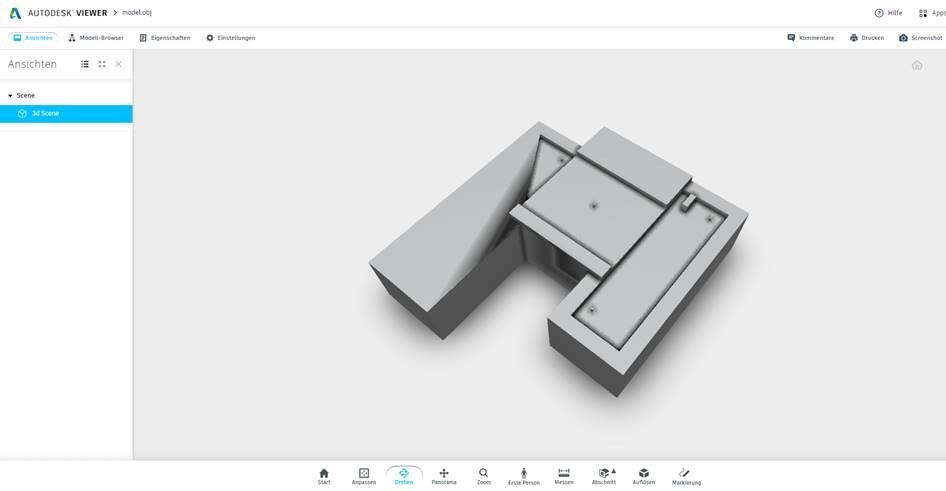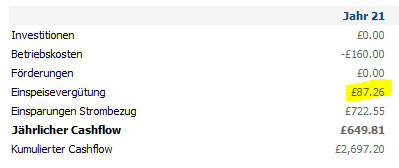-
Posts
1,855 -
Joined
-
Last visited
-
Days Won
173
Everything posted by developer_mh
-
Hi Muhammad, like timgreen said, the best way to go is to model it in another 3D application like Sketchup and import it then. A canopy like this is not possible with the built-in 3D design tools of PV*SOL. Kind regards, Martin
-
Hi Julius, our technical hotline staff found out that the model is already broken in the exported obj file: This might be related to a surface normal that is pointing downwards instead of upwards, or an area that is not completely closed. They recommend to compare the right and left attic as precisely as possible in order to find differences in the model. Hope that helps, kind regards, Martin
-
Hi Julius, sometimes there are problems with attics of imported models. Could you provide the model so that our technical hotline can have a look at it? You can send it here via private message or directly to hotline@valentin-software.com Thanks a lot in advance, Martin
-
Dear Cezary, thanks a lot for the project file. I had a look into it and found a bug, unfortunately. It is not related to Hoymiles inverters specifically, but with this specific configuration that i sused in your project. The bug will be fixed with the next release after the upcoming release PV*SOL premium 2020 R9 (it is on the way to be published already, so it is too late for the bugfix, I am afraid). I will send a modified project file in a private message to you so that you can simulate it. There I modified the configuration a bit as you will see, just to avoid this specfic bug. Hope that helps, kind regards, Martin
-

Wirtschaftlichkeitsberechnung und Cash-Flow Tabelle
developer_mh replied to Veronika Preißinger's topic in PV*SOL
Hallo Veronika, danke für die Projekt-Datei. Um die verschiedenen Effekte, die bei der Wirtschaftlichkeitsberechnung eine Rolle spielen, auseinanderzuhalten, habe ich erstmal die Moduldegradation auf 100% (also keine Degradation), den Kapitalzins auf 0% und die Preissteigerungsraten auf 0% gesetzt. Die Abrechnungsjahre in der Cashflow-Tabelle beginnen immer am 01. des Inbetriebnahme-Monats. Wenn das Datum der Inbetriebnahme der 07.08. ist, ginge das Jahr 1 in der Cashflow-Tabelle also vom 01.08. bis zum 31.07. des Folgejahres. Das bedeutet in diesem Beispiel zweierlei: Die ersten sechs Tage des August gehen für die Abrechnung verloren (und werden auch nicht hinten angehängt) Im Jahr 21, also nach Ablauf des Betrachtungszeitraums wird nur noch die Einspeisung des Restjahrs vergütet, also vom 07.08. bis zum 31.12. In Zahlen sieht das so aus (sorry für das Pfund-Zeichen, ist auf meinem Rechner noch so eingestellt), hier fehlen die ersten sechs Tage des August Und hier wird nur noch die Einspeisung des Rest-Jahres vergütet: Wenn man jetzt die Moduldegradation mit rein nimmt, wird die jährliche Einspeisevergütung natürlich von Jahr zu Jahr geringer: Und wenn man dann den Kapitalzins (Umlaufrendite) wieder auf 1% setzt, wird die Einspeisevergütung noch geringer, da sie ja dann in Zukunft weniger wert ist: Die Preisänderungsfaktoren spielen dann eben auch noch mit rein, aber ich führe das mal nicht weiter aus, das Prinzip wird ja klar. Ich hoffe, das hilft ein wenig beim Verständnis der doch komplexen Materie. Wenn du noch Fragen hast, gerne fragen. Beste Grüße, Martin -

Wirtschaftlichkeitsberechnung und Cash-Flow Tabelle
developer_mh replied to Veronika Preißinger's topic in PV*SOL
Hallo Veronika, wenn die Werte im zweiten Jahr im Vergleich zum ersten Jahr steigen, hat dies in den meisten Fällen mit dem Inbetriebnahmedatum oder der Gültigkeit der Tarife zu tun. Um im konkreten Fall eine Antwort geben zu können, wäre es hilfreich, wenn du eine Projektdatei zur Verfügung stellen könntest, an der wir die Zahlen direkt nachvollziehen können. Du kannst sie gerne per privater Nachricht schicken. Beste Grüße, Martin -
Dear Mahmoud, in PV*SOL we always model PV systems with batteries with two separate inverters, one for the PV and one for the batteries. However, in reality these two inverters can be combined in one product. Hope that helps, kind regards, Martin
-
Hi Cezary, could you provide more detail about what exactly happens? Also, it would be helpful if you could send us your program log files. You can find them at C:\ProgramData\Valentin EnergieSoftware\log If you have a project file that you could send me via private message, it would be even easier to identify the problem. Thanks ans kind regards, Martin
-
Hi JL, a tax bonus like this can not be calculated by PV*SOL, I guess you would need a tax software for that. Kind regards, Martin
-

Simulation von Freileitungen, die zur Verschattung führen
developer_mh replied to Rixxe's topic in PV*SOL
Hallo Rixxe, den kurzen Pfosten kann man noch mit Hilfe eines sehr schmalen Schornsteins nachbilden, aber die Stromleitungen dann nicht mehr. Es gäbe aber die Möglichkeit, das gesamte Haus mit Aufbauten in einem externen 3D Programm (z.B. Sketchup) zu modellieren und dann in PV*SOL zu importieren. Dann hätte man auch die Leitungen drin. Beste Grüße, Martin -

Optimale SolarEdge Auslegung / maximale Distanz zwischen zwei Optimierern
developer_mh replied to nevs's topic in PV*SOL
Hallo nevs, eine solche Regelung ist uns bisher von SolarEdge nicht mitgeteilt worden, aber um sicher zu gehen, würde ich empfehlen, einfach mal SolarEdge zu kontaktieren. Wenn du eine Antwort erhalten hast, würde uns das hier im Forum sehr interessieren! Vielen Dank und beste Grüße, Martin -
Hi John, we re-developed, updated and unified the load profile features in version 2020, so unfortunately you can't edit some of the older load profiles from version 2019 or before. This applies to individual appliances and load profiles from day profiles. You can simulate those profiles without problems, however. Hope that helps, kind regards, Martin
- 26 replies
-
- Half Hourly
- HHM
- (and 6 more)
-
Hi Krzysztof, we have not encountered this error before, but it seems that you are on the right track. Did you try to run the Windows Update after installing the C++ redistributables? And also, as always in Windows, don't forget to restart your system. Kind regards, Martin
-
Hi ChaseSecrist, I will forward this enquiry to our database team so that they can enter the inverter. How does PV*SOL say that the inverter is not compatible? Can you give us more detail on the configuration you wanted to achieve? Thanks in advance, kind regards, Martin
-
Hi Miguel, you can also add your own company to the database and then use it. Go to database -> Companies, then choose "New" from the Actions Menu. Then, when you create a new product, yu'll have to open the full company dialog in order to see your company. In the dropdown on the left, only companies are shown that have products of the current product type. Hope that helps, kind regards, Martin
-
Hallo bene-solar, ja, in der Tat, da ist uns ein Fehler unterlaufen. Hersteller, die keine lieferbaren Produkte mehr haben, werden derzeit nicht mehr dargestellt. Wir werden den Fehler im nächsten Release beheben (2020 R9). Dann muss man nur die Option "Auch Produkte, die nicht mehr lieferbar sind" aktivieren, dann bekommt man auch wieder Sanyo angezeigt. Beste Grüße, Martin
-
Hallo Gerald, für die Berechnung der Abschattungsverluste empfehlen wir in jedem Fall die 3D-Umgebung. Gerade, wenn es um gegenseitige Abschattung geht. Ferne Objekte wie eine Silhouette aus Hügeln, Bergen, weit entfernt stehenden Häusern etc. kann man gut und mit ausreichender Genauigkeit über Horizontlinien abbilden. Aber bei nahen Objekten und Reihenabschattung sollte man unbedingt die Anlage in der 3D-Umgebung simulieren. Beste Grüße, Martin
-
Dea JoelB, thank you for the projects. Offgrid projects are a bit more difficult to design since there is no grid that could absorb or provide energy when there is too much or too less in the system. In your case, example "Benisheikh Police Radio Station", there is a high consumption with annual values of about 37000 kWh, but the PV system only has 3.5 kWp. In Nigeria you can calculate with approx. 1500 kWh/kWp solar energy per year, so you'll get 3.5 * 1500 = 5250 kWh of PV energy. This is far too less for your consumption, and there isn't another energy source in the system. So the first thing to look at is the energy values of consumption, PV and batteries. Consumption and PV production have to be roughly in the same range, the more PV there is, the better. The battery size in kWh is then chosen dependent on the desired autonomy size. It will be about three times the daily consumption. The second thing to look at are the power values. If your PV system provides 100 kWp, but your battery can only work with 2 kW, you will have a lot of energy unused. The PV power, the battery power and the peak load power should be in the same range. To make things easier when starting with offgrid projects, you can activate the load shedding feature on the consumer's page. If there isn't enough PV or battery power or energy to supply the consumers they will be shut off temporarily. Hope that helps, kind regards, Martin
-
Hi JoelB, would it be possible for you to send us the project file? That would make it a lot easier for us to identify the problem. You can send it to me via private message here in the forum. Thanks and kind regards, Martin
-
Hello afbialecki, Im am afraid that these two options are not available in PV*SOL premium right now. But thank you for the suggestions, we will write them on our list of possible future features. What would be a naming scheme for the screenshots that you have in mind? Kind regards, Martin
-
Hallo PeterZ, man kann die Module, die auf solchen Dachflächen platziert werden, miteinander verschalten, das geht. Aber man kann zwei unterschiedliche Dachflächen nicht wie eine große belegen, also dass Module evtl. auch über dem Stoß platziert werden könnten. Die zwei Gebäude als eins zu konstruieren und das fehlende Dachstück mit einer Sperrfläche von der Belegung auszunehmen, ist eine Möglichkeit, ja. Mit dem von dir genannten Nachteil, dass es in der Präsentation nicht optimal aussieht. Eine weitere Möglichkeit wäre, das Haus z.B. in Sketchup zu modellieren und dann in PV*SOL zu importieren. Photoplan oder die Dachbelegung wären zwei weitere Optionen, die dann aber nicht mehr auf der 3D-Planung beruhen, sondern im Hauptprogramm zu finden sind. Beste Grüße, Martin
- 1 reply
-
- 1
-

-
Hi ChaseSecrist, thank you for your question and the explanations. The setup you are inteding to reproduce will not be easy to accomplish in PV*SOL. The reason is that the amount of PV energy that can be used by the consumers is simulated (in contrast to be defined by the user). It depends on the load profile, the wattage at any point in time, and the amount of available PV power at that time. For example, if the PV power at 11am exceeds the power consumtion at that time, the exceeding PV power will be fed into the grid. On the other hand, if there is not enough PV power to supply the appliances, the remainder will be drawn from the grid. I do understand the need for your comparison, however. But I wonder how the problem of synchrony between PV production and consumption is regulated in the PPA? What if you as a electricity seller provide the energy, but the buyer can't use it entirely due to his load profile? Kind regards, Martin









